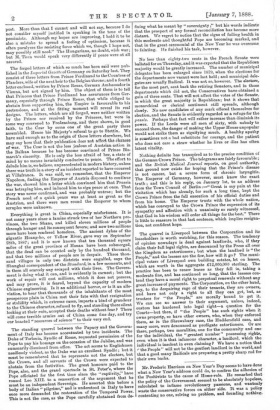The forged letters of which so much has been said
were pub- lished in the Imperial Gazette of Germany on Saturday last. They
consist of three letters from Prince Ferdinand to the Countess of Flanders, wife of the next heir to the Belgian throne; and a fourth letter enclosed, written by Prince Reuss, German Ambassador in Vienna, but not signed by him. The object of them is to tell that Princess that Prince Ferdinand has assurances from Ger- many, especially through Prince Reuss, that while obliged to abstain from supporting him, the Empire is favourable to his pretensions, and at the fitting moment will reveal its real designs. The letters, which are all forged, were neither written by the Prince nor received by the Princess, but were in some way conveyed to Fredeneborg, and there shown, in good faith, to the Czar by some one of the great party there assembled. Hence his Majesty's refusal to go to Stettin. We have said enough as to the origin of these letters elsewhere, but may say here that their publication does not affect the chances of war. The Czar is not the less jealous of Austrian action in the Balkan because he has become convinced of Prince Bis- marck's sincerity. He is only the less afraid of her, a state of mind by no means invariably conducive to peace. The effort to delude him is, we believe, unprecedented in modern history, unless there was truth in a story of an incident reported to have occurred at Tillafranea. It was said, we remember, that the Emperor Napoleon, finding the Emperor of Austria disposed to continue the war, showed him a letter which convinced him that Prussia was betraying him, and induced him to sign peace at once. That story was never confirmed, and was probably untrue; but the French need of a quick peace was at least as great as the Austrian, and there were men round the Emperor to whom scruples were unknown.






















































 Previous page
Previous page